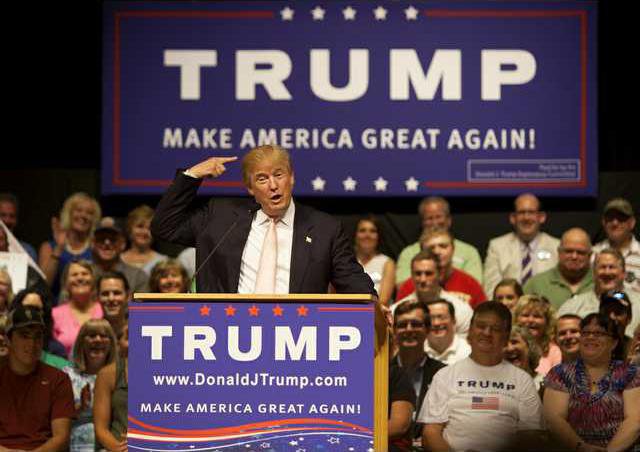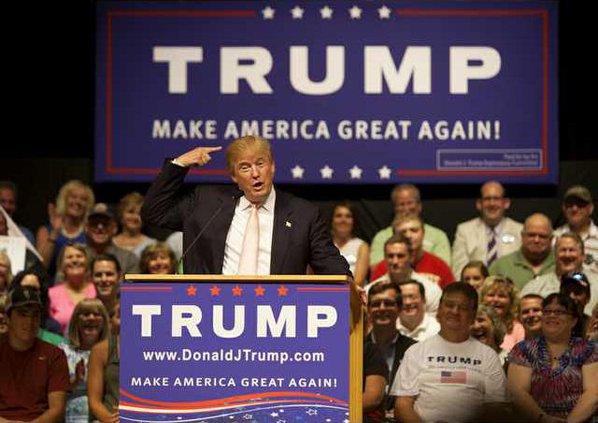Nearly six months into his presidential bid, the news media is still struggling with the conundrum of covering Republican candidate Donald Trump.
As previously reported, Trump's position as a front-runner in the GOP race is difficult because it demands coverage, yet the media runs the risk of having the public believe the candidate's untruths if they devote too much time to him.
As Vox reported in the wake of what it called "a mess of the television program," referencing Trump's recent appearance on ABC's "This Week," host George Stephanopolous tried to correct Trump at almost every turn, it was tough to keep up. In the course of the interview, Trump spouted falsehoods about Syrian refugees, American Muslims celebrating during the 9/11 attacks and gun laws.
"TV news is also in the business of covering leading politicians, particularly ones the polls indicate are likely to get a major party's nomination for the presidency. So not covering Trump feels actively irresponsible," Vox reported.
But many media outlets may finally be getting the hang of how to best deal with the flagrant remarks that have become the hallmark of Trump's campaign: Cover and debunk them.
The Washington Post has published numerous articles on some of Trump's statements, the latest of which concerned the front-runner's enthusiasm for waterboarding interrogation techniques, where Trump told a crowd of supporters, "Believe me, it works. And you know what? If it doesn't work, they deserve it anyway."
Media outlets are also finally pushing back on Trump's restrictions on campaign coverage, the Post reported, after months of top aides threatening to pull credentials and "blacklist" journalists.
The New York Times also took a stand in a scathing editorial this week blasting what it calls Trump's "racist lies" about Syrian refugees, comparing him to other unsavory politicians like Joseph McCarthy and George Wallace. The Times urged all media outlets to remain vigilant in calling Trump out for lying.
"If its a lie too vile to utter aloud, count on Mr. Trump to say it, often. It wins him airtime, and retweets through the roof," the Times wrote. "History teaches that failing to hold a demagogue to account is a dangerous act. Its no easy task for journalists to interrupt Mr. Trump with the facts, but its an important one."
As previously reported, Trump's position as a front-runner in the GOP race is difficult because it demands coverage, yet the media runs the risk of having the public believe the candidate's untruths if they devote too much time to him.
As Vox reported in the wake of what it called "a mess of the television program," referencing Trump's recent appearance on ABC's "This Week," host George Stephanopolous tried to correct Trump at almost every turn, it was tough to keep up. In the course of the interview, Trump spouted falsehoods about Syrian refugees, American Muslims celebrating during the 9/11 attacks and gun laws.
"TV news is also in the business of covering leading politicians, particularly ones the polls indicate are likely to get a major party's nomination for the presidency. So not covering Trump feels actively irresponsible," Vox reported.
But many media outlets may finally be getting the hang of how to best deal with the flagrant remarks that have become the hallmark of Trump's campaign: Cover and debunk them.
The Washington Post has published numerous articles on some of Trump's statements, the latest of which concerned the front-runner's enthusiasm for waterboarding interrogation techniques, where Trump told a crowd of supporters, "Believe me, it works. And you know what? If it doesn't work, they deserve it anyway."
Media outlets are also finally pushing back on Trump's restrictions on campaign coverage, the Post reported, after months of top aides threatening to pull credentials and "blacklist" journalists.
The New York Times also took a stand in a scathing editorial this week blasting what it calls Trump's "racist lies" about Syrian refugees, comparing him to other unsavory politicians like Joseph McCarthy and George Wallace. The Times urged all media outlets to remain vigilant in calling Trump out for lying.
"If its a lie too vile to utter aloud, count on Mr. Trump to say it, often. It wins him airtime, and retweets through the roof," the Times wrote. "History teaches that failing to hold a demagogue to account is a dangerous act. Its no easy task for journalists to interrupt Mr. Trump with the facts, but its an important one."





